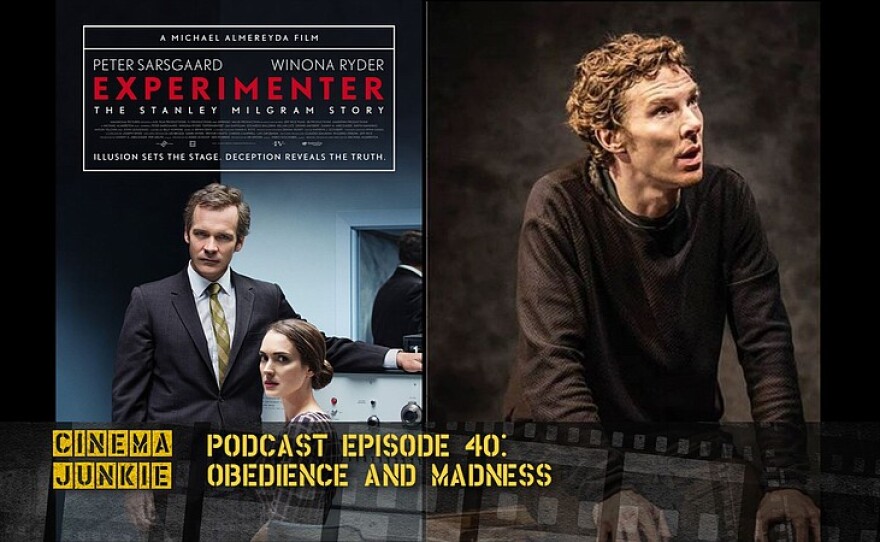It's all about obedience and madness with reviews of "The Experimenter" (opening Oct. 23 at Landmark's Ken Cinema) and National Theatre Live's "Hamlet" with Benedict Cumberbatch (screening next week).
Michael Almereyda has a new film out about social psychologist Stanley Milgram who conducted controversial experiments in the 1960s on obedience. Almereyda also filmed an adaptation of William Shakespeare’s "Hamlet" in which the sanity of more than one character is questioned. And that leads me to a new adaptation of "Hamlet" featuring Benedict Cumberbatch.
Yeah, that's a convoluted way to link two reviews that have nothing in common.
"The Experimenter"
Let’s start with Stanley Milgram and Almereyda's "The Experimenter." The film opens in 1961 as test subjects are being prepped to partake in an experiment. But as the experiment is being described, actor Peter Sarsgaard turns to the camera and addresses the audience directly.
Sarsgaard plays Milgram and during the course of the film director Almerayda has him address the audience directly. In fact, in one scene, Sarsgaard as Milgram walks down a hallway and as he talks there’s an elephant that follows him down the halls. That’s right, an elephant, and I am assuming it’s a metaphor to represent the old adage about the elephant in the room, that issue that everyone is acutely aware of, but nobody wants to talk about. Here it seems to revolve in part around the spark for his experiment, which grew out of his interest in Nazi Germany and trying to understand how people could obey orders so blindly.
Milgram initially went into the experiment thinking most people would refuse to obey. But he was wrong.
Director Almereyda is as much an experimenter and illusionist as his subject. He delivers a clever film filled with deliberate artifice to demonstrate how relevant and challenging Milgram’s work still is. At times there is deliberately unconvincing rear screen projection as Milgram drives his car or a scene plays out against an obvious photograph that stands in for a real location. It has a theatrical or staged look and the contrivance calls attention to itself in a way that makes us think about the themes of the film.
"Hamlet"
This month we also get Benedict Cumberbatch, the new Sherlock, as the melancholy Dane in the National Theatre Live production of "Hamlet."
Every generation serves up its own Hamlet and Cumberbatch definitely has the acting chops to be a defining one.
Unfortunately, Lyndsey Turner is not the director to deliver a definitive production. Here are the major flaws with her production:
The time has been updated to some vague period setting but without any real vision for why the change has been made. She randomly casts a black actor as Laertes, the brother for a white Ophelia, and the choice adds no insights to the role. A black Horatio would have made more sense and would not come across as mere racial stunt casing.
Her interpretation of how to present Ophelia results in one of the most infuriatingly bad Ophelias I have ever seen, I couldn’t wait for her to off herself. As played by Sian Brooke, Ophelia is mousy, fragile and broken from the beginning and is nothing but a mass of nervous tics.
I have to say that one of the best Ophelias ever was Helena Bonham Carter in Franco Zefirrelli’s "Hamlet" with Mel Gibson as a kind of action version of the Danish Prince.
But the production does have Cumberbatch and he is brilliant. He handles famous speeches like "To be or not to be," with freshness so we feel like the lines are new. He displays an energy and wit that Hamlet is often denied in favor of melancholia.
Turner also gives us a strong and demanding ghost and a set design that plays up a sense of gothic horror.
Despite its flaws, the National Theatre Live production of "Hamlet" is compelling to watch and, as it stands, it’s the only way you can see Cumberbatch in the role and that’s something any fan of the Bard will want to take in.
Listen to the podcast for the full review with clips from the films and a look at Almereyda's "Hamlet" from 2000.


